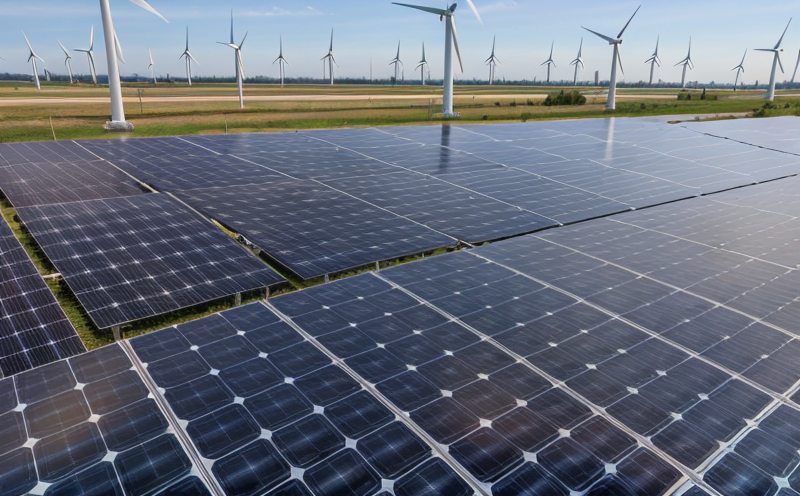IEC 60068 Environmental Testing of Grid Components
The International Electrotechnical Commission's (IEC) IEC 60068 series provides a comprehensive set of tests for assessing the environmental robustness and reliability of electrical equipment. This service focuses on testing grid components to ensure they can withstand harsh environmental conditions, thereby enhancing smart grid integration and renewable grid stability.
The IEC 60068 suite includes tests that simulate various environmental stresses such as temperature cycling, humidity exposure, altitude variations, and more. These tests are critical in the energy sector where equipment must perform reliably under diverse climate and operational conditions. Testing components according to these standards ensures they meet international quality assurance criteria.
Testing grid components using IEC 60068 helps manufacturers ensure their products comply with industry standards while also enhancing product performance and longevity. This service supports the development of reliable renewable energy systems, which are essential for integrating solar, wind, and other forms of renewable power into the electrical grid.
The tests included in this service provide a robust framework to evaluate how well components will perform under various environmental conditions. By subjecting equipment to these rigorous tests, manufacturers can identify potential weak points early on and address them before products reach market. This leads not only to improved product quality but also reduces the risk of field failures.
The testing process typically involves preparing specimens according to specified guidelines, placing them in controlled environmental chambers that simulate real-world conditions, and monitoring their response over time. The results are then analyzed against predefined acceptance criteria set by IEC 60068 standards.
| Environmental Parameter | Description |
|---|---|
| Temperature Cycling | Simulates exposure to wide temperature ranges, from extreme cold to hot conditions. |
| Humidity Exposure | Evaluates the component's resilience against moisture and condensation effects. |
| Altitude Variations | Determines how well the equipment performs at high altitudes with reduced atmospheric pressure. |
| Vibration Testing | Assesses the stability of components during transportation or operation in vibrating environments. |
Testing according to IEC 60068 is particularly important for grid components because it ensures that these devices can operate reliably even under challenging environmental conditions. This testing is crucial for integrating renewable energy sources into the existing power infrastructure, as these systems often face severe weather and climatic variations.
The service also includes detailed reporting tailored to meet the needs of quality managers, compliance officers, R&D engineers, and procurement teams. These reports provide comprehensive insights into the tested components' performance, highlighting any areas where improvements are necessary.
Industry Applications
| Application Area | Description |
|---|---|
| Renewable Energy Integration | Evaluates the ability of grid components to withstand harsh environmental conditions, ensuring reliable performance in renewable energy systems. |
| Smart Grid Development | Tests the robustness of smart metering and monitoring devices used in modern electrical grids. |
| Solar Power Systems | Evaluates solar inverters, transformers, and other critical components for their durability under various environmental stresses. |
| Wind Turbine Components | Assesses the reliability of wind turbine blades, generators, and other associated equipment in diverse weather conditions. |
| HVDC Systems | Determines the performance of high-voltage direct current systems under extreme environmental conditions. |
| Battery Storage Solutions | Tests battery packs and related components for their ability to function optimally in various climates. |
The testing provided by this service is essential for the development of efficient, reliable, and sustainable energy solutions. By ensuring that grid components can withstand harsh environmental conditions, we contribute to more robust and resilient renewable energy systems.
Quality and Reliability Assurance
- Temperature Cycling: Ensures that the component can handle rapid changes in temperature, which is crucial for outdoor equipment used in diverse climates.
- Humidity Exposure: Evaluates how well the component withstands moisture conditions, preventing corrosion and degradation.
- Altitude Variations: Checks performance at high altitudes where atmospheric pressure changes significantly.
- Vibration Testing: Simulates transportation or operational vibrations to ensure stability and functionality during these conditions.
The rigorous testing procedures outlined above are designed to identify potential issues early in the product development cycle, ensuring that only the highest quality components enter commercial use. This approach not only enhances reliability but also extends the lifespan of equipment, reducing maintenance costs and downtime.
Use Cases and Application Examples
| Application Case | Description |
|---|---|
| Solar Panel Inverter Testing | Evaluates inverters used to convert solar energy into usable electricity for the grid. |
| Wind Turbine Generator Inspection | Assesses wind turbine generators for their ability to operate efficiently under varying environmental conditions. |
| HVDC Transformer Evaluation | Determines the performance of high-voltage direct current transformers in extreme environments. |
| Battery Storage System Assessment | Tests battery storage systems for their durability and reliability under harsh environmental conditions. |
The tests performed by this service are applicable across various sectors within the energy industry, including renewable energy integration, smart grid development, solar power systems, wind turbine components, HVDC systems, and battery storage solutions. Each application example highlights the importance of ensuring that critical components can operate reliably in diverse environmental conditions.





